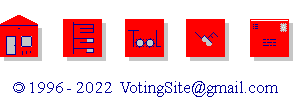|
Different uses for voting
need different types of voting. |
 |
Research & Development
|
 |

|
Tasks for democratic reformers. Find volunteers or donations for these 5 Priorities.
The first two will produce some tools needed to implement accurate democracy. The third builds tools for democracy trainers. The last two aim to motivate readers to reform voting rules. Parliamentarians can improve the most common voting situation, enacting policies. We need to combine rules of order with preferences ballots which ranking many variations of a policy at once, for reasons given in that chapter. This will flatten and simplify the hierarchy of parliamentary motions, but it will require testing and refinement by small committees before it can be used by legislatures. This is the biggest and most rewarding step toward more accurate democracy. Political journalists Some stories might be similar to Harvard Business School's celebrated case studies, but with a focus on governance: elections and legislation.
Pollsters Using preference ballots and accurate voting rules can reveal the center and diversity within an electorate. It can expose the gaps between voters and politicians. This could be a class project, but it is certainly more than one person can achieve. (This is the only long-term item.) Programmers Ideas for improving democracy were just hot air when users could not get practical tools. This site has a page listing the tools we know of. It also has prototype software, written in Excel, for fair-share allocation tallies. The next step is improving that code or other open-source code to handle voting and tallies for projects, policies and budgets. Political science teachers can develop workshops using tabletop tallies, graphics, PoliticalSim and other software.
Fair-share Spending is already a very good tool like the STV rules from which it has developed. But which tally options are most useful, leading to the highest-valued set of projects and to equality among voters? Simulations could help optimize this tradeoff. Better software could speed simulations for research. The results and analysis could lead journal articles. Those publications could give authority to workshops and consulting. Consulting and classes could produce income to support research and marketing.
Why is there little public effort to improve government systems? Government influences: taxes, health and safety, pension, work rules, education... Systemic improvements in electoral or legislative rules are likely to cause improvements in many policies. But few citizens are aware of the variety of voting rules and their influence on policies affecting our lives. Professor Randall Collins at the University of Pennsylvania suggests three causes of intellectual and cultural stagnation: forgetting prior research, worship of past classics, and technical over refinement. Most individuals and communities did not forget prior research, they never learned it. The greatest legacies of research into single-winner or multi-winner elections are the Condorcet rules and PR rules. Both are essential to accurate democracy. Venerating that legacy or earlier democratic methods leads to ignoring current research. That is a sad mistake because social choice research has made great progress in recent years. On the other hand, obsessive debate by current researchers over mathematical details has little social benefit. In fact the chances for improving democracy are weakened when a reformer attacks peers for supporting the "wrong" Condorcet completion rule or PR quota.
Technical upgrades usually come from science and engineering. Many technical changes are easy to implement because they do not require cooperation; you can upgrade private goods such as your car even if others will not or can not do the same. Early adopters assume the risks, and if they succeed, show others the benefits. But you cannot upgrade public goods such as a bus system (or voting system) without involving many people in studies and meetings slowly reaching a broad agreement. Reformers can minimize this problem by working with membership organizations that trumpet democracy as a primary goal.
|
| ||||||
|---|---|---|---|---|---|---|
| Electoral Systems | Legislative Systems | |||||
Chair
| Reps
| Council
| Policy
| Projects
| Budgets
|
Software
Simulations Printouts  To Do U.S. Reforms  Voting Glossary Resources |

|
|




 Accurate Democracy
Accurate Democracy 

